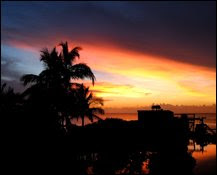
16 December 2011
Celebrating 20 years at KML

09 December 2011
Welcome Trevor, new KML staff scientist

Trevor Luna joined the KML team as a Biological Scientist for FWC/FWRI in December of 2011. He graduated with a Bachelors of Arts in Biology from Rollins College in Winter Park, FL before moving to Zambia, Africa to serve in the U.S. Peace Corps. There he worked with the Zambian Department of Livestock and Fisheries as an Aquaculture Extension Agent promoting rural Tilapia culture. Trevor is an avid boater, diver, fisherman and hunter. The KML team is very excited to have Trevor on board. Welcome Trevor!
01 November 2011
Adaptation to loacal environment in corals?
Are corals genetically adapted to different habitats, or are they able to change their physiology to match novel environmental conditions? Carly Kenkel, a PhD candidate from the University of Texas at Austin hopes to answer this question for her model coral species, the Mustard Hill Coral (Porites astreoides), in the Florida Keys. She came to KML to set-up a large reciprocal transplant experiment to test for local adaptation of P. astreoides to differing thermal environments in the Keys. Because she was only able to spend 5 days here, the KML staff scientists helped with her collections and field deployment of the experiment. KML divers collected 15 P. astreoides colonies from a near-shore and off-shore site.
Carly then fragmented these colonies using a tile saw, and mounted them on cement pucks with cattle tag labels to keep track of all the individuals.
Finally, Carly weighed all the fragments so that she can monitor growth during her experiment.






